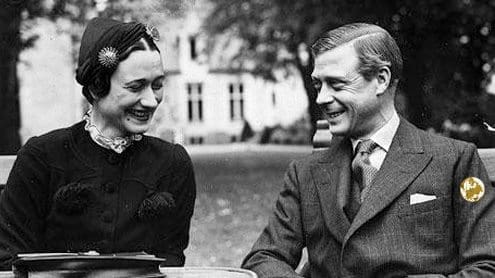 The details seem quaint now, but in December 1936 – just 80 years ago – the big news concerned the abdication of King Edward VIII. And what makes the affair incomprehensible to modern sensibilities is that it was driven by his choice of a bride.
The details seem quaint now, but in December 1936 – just 80 years ago – the big news concerned the abdication of King Edward VIII. And what makes the affair incomprehensible to modern sensibilities is that it was driven by his choice of a bride.
Neither of the starring players could be described as being in the first flush of youth. Freshly crowned, Edward was 42 years old, while his paramour – the American, Wallis Simpson – was 40. He’d never been married, but she was in the process of obtaining her second divorce.
They’d met at a party in January 1931, and became lovers. By 1936, their affair was common knowledge in the U.S. and European press but studiously kept out of the British media by a protective gentlemen’s agreement. In the pre-internet era, where international travel was a luxury for the few, it was still possible to pull that off.
Edward’s bachelor status shouldn’t be construed as evidence of a sheltered life. Raffish and charming, he was a practised ladies’ man with a particular avocation for married women. Things were safer that way.
Wallis, too, was vastly experienced. Although contemporary photos don’t give the impression of great beauty, she clearly had something to offer in pursuit of her twin interests in men and money.
And there are suggestions that she enjoyed living dangerously. Special Branch papers publicly released in 2003 claim that, while still married to her second husband and conducting an affair with Edward, she also had a fling with a married man named Guy Trundle. In Special Branch’s telling, Trundle was a “very charming adventurer, very good looking, well bred and an excellent dancer.”
(For the record, historian Andrew Roberts is skeptical of the Trundle story. Citing a source who reported that Wallis was an accomplished card player, Roberts speculates that reports of her being at Trundle’s house until the early morning hours may be indicative of nothing other than a late-night poker school.)
It was in November 1936 that the affair morphed from suppressed scandal to full-blown constitutional crisis. Edward informed the British prime minister, Stanley Baldwin, of his intention to marry Wallis. Baldwin, who’d never been susceptible to Edward’s charm, was having none of it.
Drawing on the distinction between private and public life, Baldwin was clear: “I think I know our people. They will tolerate a lot in private life, but they will not stand for this sort of thing in a public personage.” Edward was being educated on the fact that 20th century British monarchs reigned but didn’t rule.
There were two problems.
One was the sovereign’s legal position as Supreme Governor of the Church of England. This precluded marriage to a divorcee.
The other problem had to do with contemporary social attitudes. While divorce was legal in the 1930s, it was relatively rare and generally frowned upon. And as far as his public life was concerned, the King was expected to set an example.
Edward, however, didn’t capitulate easily. On Nov. 25, he proposed a solution to the dilemma. He would have a morganatic marriage, whereby he would remain King but Wallis wouldn’t be Queen. Instead, she’d be his consort.
Again, Baldwin demurred. There were, he told Edward, three choices: end the relationship; marry against the government’s advice, in which case the government would resign; or abdicate.
Now desperate, Edward tried one more ploy. He would present his case to the people via a BBC radio broadcast. He would tell them that he was a “very lonely man” who was “firmly resolved to marry the woman I love, when she is free to marry me.”
With Edward’s personal popularity, it might have worked. But he didn’t get the chance.
As the government’s legal opinion starkly phrased it, “The sovereign can make no public statement on any matter of public interest except on the advice of his ministers.” In a constitutional monarchy, the King was checkmated.
Edward, however, was ultimately allowed to make a radio address. On Dec. 11, 1936, he got to announce his abdication.
Although the whole episode sounds unbelievable to us today, there was a silver lining. Given the ambiguity around Edward’s attitude towards Nazi Germany, maybe his subjects dodged a bullet.
Perhaps we all did.
Troy Media columnist Pat Murphy casts a history buff’s eye at the goings-on in our world. Never cynical – well perhaps a little bit.
The views, opinions and positions expressed by columnists and contributors are the author’s alone. They do not inherently or expressly reflect the views, opinions and/or positions of our publication.

